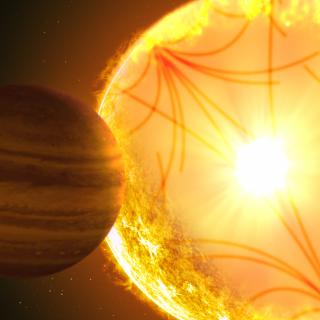Bibcode
Hekker, S.; Elsworth, Y.; De Ridder, J.; Mosser, B.; García, R. A.; Kallinger, T.; Mathur, S.; Huber, D.; Buzasi, D. L.; Preston, H. L.; Hale, S. J.; Ballot, J.; Chaplin, W. J.; Régulo, C.; Bedding, T. R.; Stello, D.; Borucki, W. J.; Koch, D. G.; Jenkins, J.; Allen, C.; Gilliland, R. L.; Kjeldsen, H.; Christensen-Dalsgaard, J.
Bibliographical reference
Astronomy and Astrophysics, Volume 525, id.A131
Advertised on:
1
2011
Journal
Citations
119
Refereed citations
102
Description
Context. The large number of stars for which uninterrupted
high-precision photometric timeseries data are being collected with
Kepler and CoRoT initiated the development of automated methods to
analyse the stochastically excited oscillations in main-sequence,
subgiant and red-giant stars. Aims: We investigate the
differences in results for global oscillation parameters of G and K
red-giant stars due to different methods and definitions. We also
investigate uncertainties originating from the stochastic nature of the
oscillations. Methods: For this investigation we use Kepler data
obtained during the first four months of operation. These data have been
analysed by different groups using already published methods and the
results are compared. We also performed simulations to investigate the
uncertainty on the resulting parameters due to different realizations of
the stochastic signal. Results: We obtain results for the
frequency of maximum oscillation power (ν_max) and the mean large
separation (<Δν>) from different methods for over one
thousand red-giant stars. The results for these parameters agree within
a few percent and seem therefore robust to the different analysis
methods and definitions used here. The uncertainties for ν_max and
<Δν> due to differences in realization noise are not
negligible and should be taken into account when using these results for
stellar modelling.
Table 7 is only available in electronic form at http://www.aanda.org
Related projects

Helio and Astero-Seismology and Exoplanets Search
The principal objectives of this project are: 1) to study the structure and dynamics of the solar interior, 2) to extend this study to other stars (either single or in binary systems), 3) to search for extrasolar planets using photometric methods (primarily by transits of their host stars) and their characterization with complementary radial
Savita
Mathur